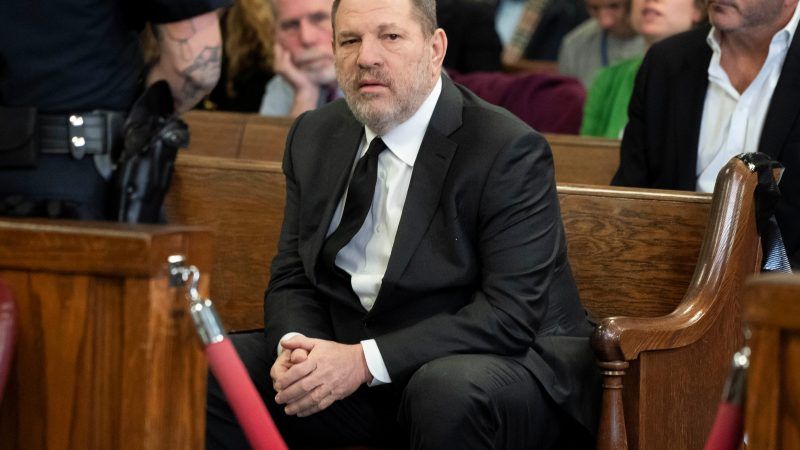Harvey Weinstein Is Terrible. Calling Him a Sex Trafficker Is Absurd
Nonetheless, a judge will let a sex trafficking complaint against Weinstein proceed.

According to a vast array of evidence, movie producer Harvey Weinstein is not a good man. After all, dozens of women have accused him of abuses ranging from pressuring women into sexual activity in exchange for movie roles to forcible sexual assault. But Weinstein also isn't a sex trafficker, under popular or legal conceptions of the term. And treating him as such is both an insult to actual victims of forced prostitution and a dangerous precedent to set.
Nonetheless, a federal judge has ruled that a class action lawsuit accusing Weinstein of sex trafficking may proceed. The civil suit, first filed in 2017, involves 10 named defendants seeking damages for events that allegedly occurred from 2004-2013.
On Thursday, U.S. Judge Alvin K. Hellerstein dismissed all but one of the claims in the 18-count lawsuit, including all claims against defendants other than Weinstein (The Weinstein Company, Miramax Films, The Walt Disney Company, and others had also been named). However, Hellerstein denied Weinstein's motion to dismiss the claim brought against him for alleged violations of the Trafficking Victims Protection Act (TVPA) of 2000.
The TVPA created a new federal criminal category for trafficking in persons, an umbrella offense that includes forced labor (a.k.a. labor trafficking); forced or coerced prostitution (a.k.a. sex trafficking); and any prostitution involving anyone under 18 years old (a.k.a. child sex trafficking). Over the past two decades, well-intentioned fervor for fighting these horrific happenings has ballooned into a massive mandate to stop all prostitution, even when it's between consenting adults. (Just look at the Florida massage parlor stings that ensnared Patriots' owner Robert Kraft for one recent example.)
And lately, we're seeing a new distortion: "sex trafficking" being used as a catch-all criminal charge against anyone accused of any sort of bad sexual behavior or alleged sexual crimes.
Actress Allison Mack and other members of the NXIVM "empowerment group"/cult were indicted on federal sex trafficking charges last year, even though no one in the group alleges any sort of prostitution happening. In both the NXIVM case and this one, proposing sexual activity that may be beneficial beyond the sex itself is enough groundwork for a sex trafficking claim.
In the NXIVM case, the feds claimed that Mack was guilty of sex trafficking because she tried to persuade some female members to sleep with the group's leader, Keith Raniere, and may have moved up the NXIVM ranks or received other in-group benefits if they did.
In the suit against Weinstein, defendants say that he promised them film opportunities or career advancement if they engaged in sexual acts with him; that he assaulted or attempted to assault them when they refused; and that because Weinstein's handlers and employees sometimes coordinated meetings between him and defendants, they were all part of a sex-trafficking enterprise together. Weinstein is apparently the "john" in this scenario, the women both the victims of trafficking and the recipient of its rewards (so, both victim and trafficker); and those who helped with Weinstein's scheduling are accomplices.
It makes no sense.
Sexual assault and rape are bad enough on their own, of course. So why the need to force these cases into a framework that doesn't fit?
Because the sex trafficking framework allows for a lot more prosecutorial possibilities. Anyone who is even remotely aware of potential trafficking can be wrapped into racketeering, money laundering, and conspiracy counts, which isn't the case with sexual assault or rape charges. A rape case against Weinstein couldn't have snared Disney, too. Nor could Allison Mack and others be indicted if Raniere was simply accused of assault.
"Sex traffickers" can be sued in federal court, while cases against rapists must go to state court. Sex trafficking convictions bring an array of mandatory fees and fines for both the government and victims; sexual assault charges do not. And proving that someone powerful offered commercial benefits for sex may prove easier than proving assault took place, especially if many years have passed.
Plus, sex trafficking is such a buzzword that cases employing it are guaranteed to get more attention.
But it's one hell of a slippery slope. If cases like these succeed, we can expect to see a whole lot more trumped-up trafficking cases, which could not only lead to unjust outcomes for those accused but also take resources away from prosecuting cases of labor exploitation and sexual abuse. Nobody will be helped by us further blurring the definitions and boundaries around things like sex trafficking, sexual assault, rape, prostitution, coercion, and consent.
